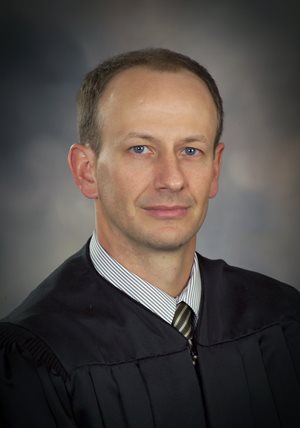 TOPEKA—Chief Judge William Mott of the 30th Judicial District has been appointed to sit with the Kansas Supreme Court to hear oral arguments in two cases on the court's September 12 docket. After hearing oral arguments, Mott will join Supreme Court justices in their deliberations and decision drafting.
TOPEKA—Chief Judge William Mott of the 30th Judicial District has been appointed to sit with the Kansas Supreme Court to hear oral arguments in two cases on the court's September 12 docket. After hearing oral arguments, Mott will join Supreme Court justices in their deliberations and decision drafting.
“I am pleased that Chief Judge Mott is taking time from his duties in the 30th Judicial District to sit with the Supreme Court,” said Chief Justice Lawton Nuss. “It's a great help to our court, and we look forward to his contributions in deliberating and eventually deciding this case.”
Mott said, “I’ve either been a district court judge or a practicing attorney in this state for the last 23 years, so it’s an honor to be extended the opportunity to sit as a judge with the Kansas Supreme Court.”
Mott is a graduate of Wellington High School, Friends University in Wichita, and Washburn University School of Law. He was in private practice for two years in Wellington, then served as county attorney in Sumner County from 1997 to 2004. He was a special assistant in the U.S. Attorney's office, primarily prosecuting drug trafficking crimes, from 2005 to 2007, when he was appointed a district court judge in the 30th Judicial District. Nuss appointed him chief judge of the 30th Judicial District in September 2017.
The 30th Judicial District is composed of Barber, Harper, Kingman, Pratt, and Sumner counties.
Mott is a past executive board member of the Kansas District Judges Association.
All Supreme Court oral arguments are webcast live through the Watch Supreme Court Live! Link in the right-hand column of the Kansas judicial branch website at www.kscourts.org.
The cases Mott will hear are the third and fourth ones scheduled on the court's 9 a.m. docket September 12:
Appeal No. 115,763: Timmy Glaze v. J.K. Williams LLC and Commerce & Industry Insurance Co.
Workers Compensation: (Petition for Review) In August 2011, Glaze was injured when he slipped and fell at work. The Kansas Workers Compensation Board dismissed his claim under K.S.A. 44-523 because his claim had not proceeded to hearing within three years of filing and he had not requested an extension within that three-year period. It was dismissed even though he had not been dilatory in pursuing his claim, he had not abandoned his claim, and there was no dispute that he had not reached maximum medical improvement. The Court of Appeals affirmed and indicated Kansas statutes required this result. The Court of Appeals also stated Glaze was not denied the right to be heard because he had the opportunity to proceed under the time requirements of K.S.A. 44-523. Issue on review is whether the trial court and Court of Appeals erroneously interpreted K.S.A. 44-523(f)(1) in dismissing a meritorious and compensable workers compensation claim solely because a written motion to extend the time for proceeding to a regular hearing was not filed within three years of the application for a regular hearing.
Appeal No. 115,629: State of Kansas v. James Lee Jamerson
Shawnee County: (Petition for Review) In 2001, Jamerson entered a plea agreement and was sentenced to 253 months in prison for the base conviction of second-degree murder, a consecutive 35 months for aggravated robbery, and a concurrent 35 months for conspiracy to commit aggravated robbery. The sentences for the nonbase convictions were the result of a downward departure. In 2015, the district court granted Jamerson's motion to correct his sentence because the criminal history for his base sentence was miscalculated. At resentencing, the district court attempted to adhere to the plea agreement by running the following sentences consecutively: 186 months for second-degree murder, 59 months for aggravated robbery, and 34 months for conspiracy (the earlier 35-month sentence was an upward departure). The Court of Appeals affirmed and reversed in part. It reasoned the resentencing on the aggravated robbery charge from 35 months to 59 months was erroneous because the primary conviction had not been overturned. It also reasoned the resentencing on the conspiracy charge to 34 months was appropriate because the 2002 sentence was based on an illegal downward departure. Finally, the court reasoned the 2015 conspiracy sentence could be ordered to run consecutively to the other sentences when it was originally run concurrently. The State petitioned for review. Issue on review is whether the Court of Appeals improperly concluded the district court erred in its methodology in resentencing Jamerson.